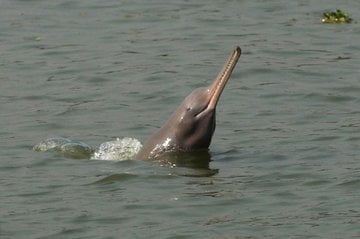Union Govt To Launch Holistic ‘Project Dolphin’ Within A Fortnight

New Delhi: The Union government will launch a holistic Project Dolphin in a fortnight’s time for conservation and protection of dolphins in rivers and oceans of India, Forest Minister Prakash Javadekar said on Monday.
He, along with Minister Of State Babul Supriyo, held a meeting with of all state forest ministers through video conferencing at Paryavaran Bhawan.
Prime Minister Narendra Modi had, in his August 15 speech, announced ‘Project Dolphin’, saying it will give a boost to biodiversity and create employment opportunities.
Javedkar took to Twitter to inform about the launch of the project.
As announced by PM @narendramodi ji on #74thIndependenceDay , @moefcc will be launching a holistic Project #Dolphin in another 15 days for the conservation and protection of the #Dolphins in the rivers and in oceans of the country.@SuPriyoBabul @PMOIndia pic.twitter.com/PfI5rVpx6I
— Prakash Javadekar (@PrakashJavdekar) August 17, 2020
Javedkar urged the states to come up with an outline for Project Dolphin within a fortnight. The project will involve long-term conservation of Gangetic dolphins and dolphins along the coasts.
According to an India TV report, Gangetic river dolphins were declared national aquatic species in 2010. These are are fresh water dolphins primarily found in the Ganga and Brahmaputra rivers and their tributaries in India, Bangladesh and Nepal.
In India, these dolphins can be sighted in long deep river reaches in Assam, Bihar, Jharkhand, Madhya Pradesh, Rajasthan, Uttar Pradesh and West Bengal.
There are about 3,700 Gangetic river dolphins in the Indian river systems. As this acts as an indicator of healthy river ecosystem, their conservation will help control river pollution, improve availability of fish and enhance economies of local communities through sustainable fishery, the ministry said.
“It envisages to address conservation concerns and empower the stakeholders like the river-dependent population in reducing river pollution and allowing sustainable fishery and river-based other livelihood options through scientifically oriented conservation methods,” it said.

Comments are closed.